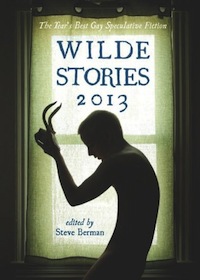Welcome back to the Short Fiction Spotlight, a space for conversation about recent and not-so-recent short stories. We’ve had a little delay on my end, but this week we’re back with a discussion of one of the collections I look forward to each year: Wilde Stories, edited by Steve Berman. The Wilde Stories series collects the year’s best gay speculative fiction, alongside sister volume, Heiresses of Russ, which collects lesbian sf.
I look forward to this book because it always seems to give an intriguing snapshot of the field in the preceding year: where gay speculative fiction was being published, by who—that sort of thing. Additionally, since Berman tends to seek out stories not just from the obvious sources, I frequently find myself encountering new voices through these books. This year’s collection, as Berman notes in his intro, seems to have a connection to bodies of water: plenty of lakes and oceans to be found. I’d also note that it seems to have a second theme: coming of age stories, stories about young men finding themselves and sometimes love.
There are many boys in this book—young men encountering the macabre or the strange while discovering things about themselves at the same time. While some stories deal with older men, such as “Renfrew’s Course” by John Langan, the majority are set on the cusp of fresh life experiences. That gives 2013’s Wilde Stories a uniquely optimistic touch. While many of the past volumes have collected quite a lot of horror or dark fantasy stories, this years’ offering seems to lean more toward the positive, adventurous end of things.
Some of these stories I found particularly heartening or uplifting in their way. “Breakwater in the Summer Dark” by L. Lark is a quintessential gay YA story about a young man coming to terms with his complex feelings for another young man while they’re at a summer camp (also, there’s a lake-monster). Alex Jeffers’ “Tattooed Love Boys” is itself a heady, youthful diversion—one that I found crunchy and provocative, though potentially problematic, in its handling of gender, embodiment, sexuality and desire. The protagonist, as she shifts via a magical tattoo into an older-brother version of herself—and decides to stay that way—has a unique perspective on her body, her self, and her sexuality; ditto her older-brother/younger-brother/younger-sister. (Seriously, this story is pretty queer.)
Hal Duncan’s “Sic Him, Hellhound! Kill! Kill!” also has an adventurous, wickedly romp-ish tone and is set in part, briefly, in a high school. This one was a treat in its careening tone, its highly referential treatment of the supernatural-in-everyday-life, and its energy. Duncan always provides a fascinating narrative voice, and the tough, mouthy, manic werewolf of this piece is the sort of narrator who certainly grabs the attention. More fascinating, though rendered only in the werewolf’s wide strokes, is his handler—a broken though strong person, making his partnership work.
And that’s hardly all. “The Keats Variation” by K. M. Ferebee is another young boy’s story, ending abruptly and handsomely with unpredictable dark magic; “Grierson at the Pain Clinic” by Laird Barron is set in a man’s later years, but deals much with his youthful indiscretions and suffering. “Wave Boys” by Vincent Kovar, too, is a post-apocalyptic (in tone) story with young, virile, adventure-and-violence oriented guys plus an abrupt ending—it’s got a sea monster, even. “Next Door” by Rahul Kanakia is a brief piece about young guys trying to survive together in a sort of post-singularity future. All of these pieces tend toward a sort of optimism—even if it’s a dark sort, like that of the sudden ending of “Wave Boys”—and a brightness of spirit that the young protagonists bring along. It makes for a different sort of Wilde Stories, one that I did enjoy and appreciate.
Interestingly enough, the stories I was least fond of tended to be the stories that didn’t fit this tonal theme. Laird Barron’s “A Strange Form of Life” nearly made me groan aloud with its use of cordyceps as a big twist—ants! zombie monsters!—and I’ve also seen, too often I’d say, the “prisoner and guard ick factor” bit in gay horror. I also wasn’t much on “Wetside Story” by Steve Vernon; the piece didn’t quite reel me in with its somewhat quirky/offbeat tone. As for stories that were perfectly fine but which I perhaps wouldn’t have called “the best,” Chaz Brenchley’s pirate story “Keep the Aspidochelone Floating” reads a bit slowly and “Night Fishing” by Ray Cluley touches on a sensitive subject—the loss of a loved one to suicide—but brings no more life and feeling to it than I’ve seen before, elsewhere.
Overall, as with the majority of Berman’s best-of collections, I enjoyed reading Wilde Stories 2013. In particular, as noted before, I appreciate that the majority of these names are not “big”—many of these stories I would not have happened upon on my own, and I very much appreciated having a chance to read them here. It’s a worthwhile buy. And, though a reader shouldn’t judge by the cover, et cetera, I would like to note in closing that this year’s edition has a lovely one.
Lee Mandelo is a writer, critic, and editor whose primary fields of interest are speculative fiction and queer literature, especially when the two coincide. She can be found on Twitter or her website.










